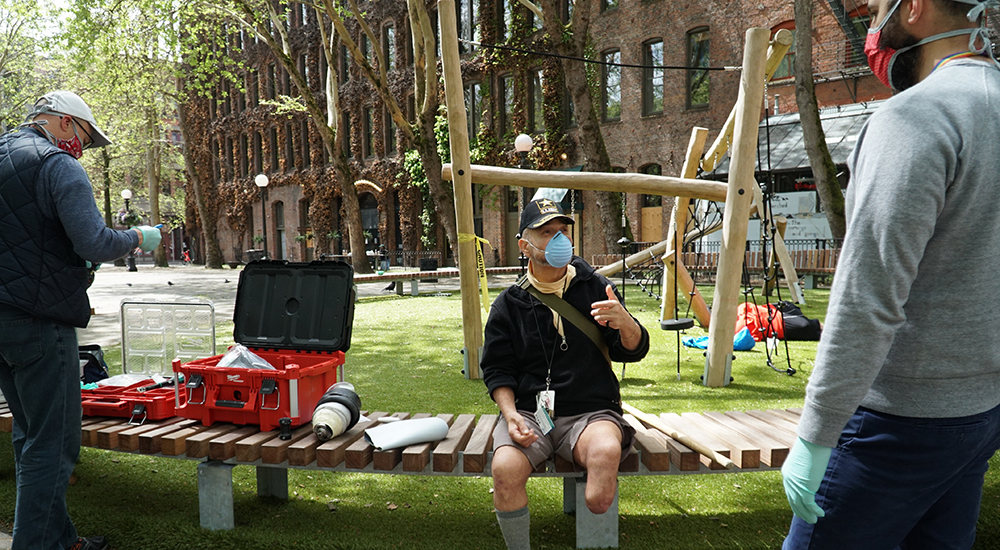Seattle’s Pioneer Square has a rich and complex history. Prior to European settlement, it had been the site of numerous Suquamish and Duwamish villages. Later, it was the original “skid road,” where freshly cut trees were skidded down the hill to the waterfront for milling.
Today, Pioneer Square is an area of the city where a dizzying mix of disparate things come together: sports stadiums, art galleries, the county courthouse and jail, luxury high-rise apartments, bail bonds offices, nightclubs, social service agencies and numerous homeless shelters.
Living in one of the several homeless shelters is Army Veteran Clinton (Chip) O’Connor. Pioneer Square is far from Chip’s birthplace of San Antonio, although he has lived in many places since first leaving home. As an Army enlistee, Chip worked as a laboratory technician in the field. He traveled the world, spending a portion of his military career in Germany.
His brilliance and skills allowed him to flourish. Later, he landed in Washington State at Madigan Army Medical Center, where he practiced as a clinical microbiologist. He later went back to school and worked as a certified nursing assistant for 14 years.
Leg was fitting poorly, causing wounds
Significant health challenges led to an amputation of Chip’s left leg in 2016, though with prosthetic care he was able to continue working for some time. Increasing physical and mental health challenges eventually led to unemployment and Chip was evicted from his apartment toward the end of 2019.
Around that time, he noticed his prosthetic leg was fitting poorly, leading to wounds on his residual limb. His VA Puget Sound Health Care System rehabilitation team advised him not to use a prosthetic leg until a new one could be constructed for him. Chip was forced to adjust to life without a stable home and using only a wheelchair for mobility.
VA Puget Sound’s Mobile Orthotic & Prosthetic Services (Mobile OPS) team first connected to Chip through his rehabilitation health care provider. Though Chip’s shelter is only a few miles from VA Puget Sound’s Seattle campus, the challenges in traveling to the campus for prosthetic appointments posed serious difficulties, particularly when he did not have a functioning prosthetic leg.
Mobile OPS physician Max Hurwitz and Prosthetist Eli Kaufman have visited Chip at his shelter several times to build a new prosthetic leg and provide related rehabilitation care. Most recently, the visits take place in a nearby park.
“I cannot thank them enough.”
“The mobile prosthetic care that VA is providing me has been life-changing,” Chip reports. “It has freed me from my chair and allowed me to interact with my environment in a way that I have not been able to for a long time. I cannot thank them enough.”
Chip’s care team is also thrilled to be able to provide care in this fashion.
“In these days, it is imperative that we have other creative ways to provide safe and effective care,” says Kaufman. “It is critical for Mr. O’Connor’s physical and mental health that he is able to move about the city for exercise and to access services. Through VA Puget Sound’s Mobile OPS, the VA has found a way to make that possible.”
Mobile OPS started at VA Puget Sound in 2018 with funding from a VHA Innovations Network (iNet) seed investment. The Mobile OPS team provides prosthetic care to Veterans who experience significant challenges in travelling to VA care facilities.
Submitted by the Puget Sound VA Health Care System.
VA Puget Sound provides comprehensive care to more than 112,000 Veterans enrolled at one of its 10 facilities in the Pacific Northwest. It oversees two divisions in Seattle and Tacoma; seven Community Based Outpatient Clinics in Bellevue, Chehalis, Federal Way, Mount Vernon, Port Angeles, North Seattle, Silverdale and South Sound; and the Community Resource and Referral Center.
As VA’s fifth largest research program, VA Puget Sound has research in virtually every major clinical department, including: TBI and multiple blast exposures; memory improvement and Alzheimer’s Disease; PTSD and deployment health; Parkinson’s Disease, diabetes; cancer; substance abuse; lower limb prosthetics; genomics; and Health Services.
Additionally, it has seven nationally recognized Centers of Excellence. Those centers were awarded in areas from limb-loss prevention and prosthetic engineering to primary care education and substance abuse treatment. For more information, visit www.pugetsound.va.gov.
Topics in this story
More Stories
Study underscores important role COVID vaccination can have in protecting Veterans from infection and reducing long-term health consequences
Columbia VA’s robotic surgery teams completed their 800th robotic surgery and are on schedule to hit 1,000 by the end of the year.
In a decentralized clinical trial, Veterans can participate from their own homes or local VA instead of having to travel to a research site.








